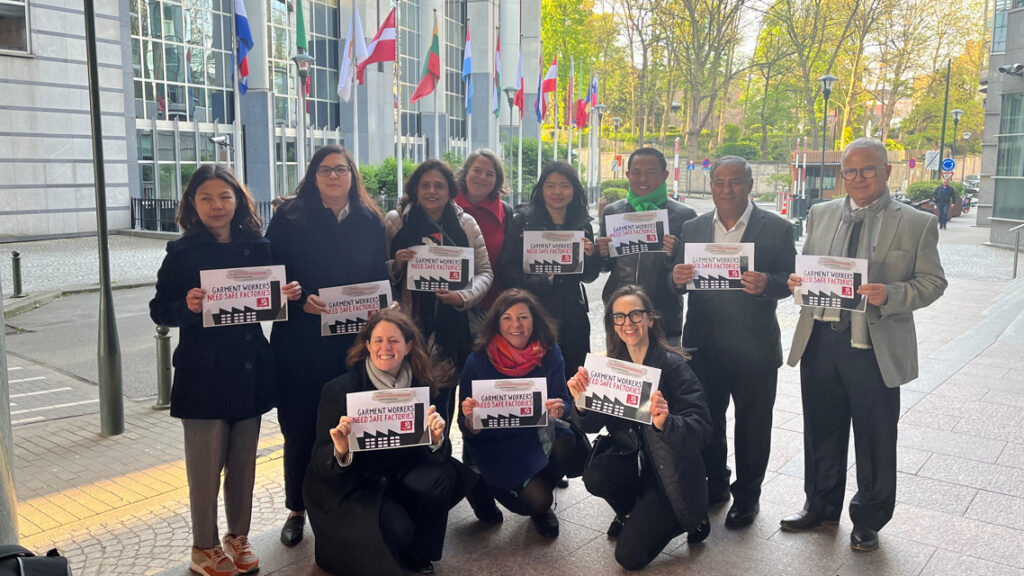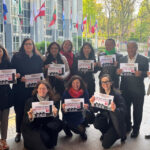4 May, 2023The 10th anniversary of the Rana Plaza collapse on 24 April was the starting point of a week-long advocacy with garment union leaders from Bangladesh, Myanmar, Cambodia and Tunisia. The delegation met with the ILO in Geneva, politicians in Berlin and the EU Parliament and Commission in Brussels to discuss the continued campaign on safe factories and the need for mandatory due diligence.
The week began with bilateral meetings at the ILO in Geneva to highlight the continued need for stronger support by the ILO. The delegation, IndustriALL sector co-chair Habib Hazimi, Tunisia, Nazma Akter, Bangladesh, and Athit Kong, Cambodia, joined a commemoration ceremony in honour of the workers who lost their lives at the Rana Plaza organized by the ILO's Bureau for Workers’ Activities (ACTRAV).
"The collapse of the Rana Plaza and its aftermath is a stark reminder that occupational safety and health is not only a fundamental right at work, but also a key step in the quest to achieve social justice for all,"
said Manuela Tomei, ILO assistant director-general for governance, rights and dialogue.
The call for a strong supply chain industrial relations took the union leaders to a conference on Asia’s textile industry hosted by the German Federal Ministry for Economic Cooperation and Development in Berlin, where they were joined by Khaing Zar from Myanmar.
As part of the panel of experts, IndustriALL textile and garment sector director Christina Hajagos-Clausen said:
“For the brands still sourcing from Myanmar despite the military coup - shame on you. You cannot talk about decent work and still source from Myanmar.”
At the Textiles Partnership’s Working Meeting Textilbündnis, Nazma Akter, president of Bangladeshi union Sommilito Garments Sramik Federation, reiterated the message that safe factories still need to be fought for:
"Only half of Bangladesh’s 4,4 million garment workers are covered by the Accord. It must continue and all brands sourcing from Bangladesh must sign it.”
In Brussels, the delegation met with members of the European Parliament (MEP) and the European commission.
“Trade unions in production countries expect the EU to push for strong mandatory due diligence,”
said Athit Kong, president of Cambodian union CCAWDU.
“The EU has the leverage to use trade relations to improve the situation for workers.”
Said Habib Hazimi, general secretary of Tunisian Textile, Clothing, Shoes and Leather Federation:
“Workers do their best to improve productivity, so why not help them and put the weight on the shoulders of multinational brands to provide decent wages, better working conditions and respect for workers’ rights.”
The union leaders came with three key demands that rely on European action and support
- Mandatory due diligence legislation that includes access to legal redress
- European companies to offer living wages throughout their global supply chains
- More brands to join the International Accord to improve workplace safety for garment workers
"The EU MADE in Myanmar project provides a front for workers’ rights violations, as it legitimises the military. EU must stop it as decent work is not possible under the dictatorship in Myanmar,”
said Khaing Zar.
“We undertook this advocacy tour to put forward a key pillar of our policy; to move away from social auditing and to move to mandatory due diligence,”
concluded Christina Hajagos-Clausen.







